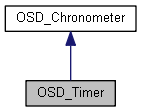Working on heterogeneous platforms we need to use the system call gettimeofday. This function is portable and it measures ELAPSED time and CPU time in seconds and microseconds. Example: OSD_Timer aTimer; aTimer.Start(); // Start the timers (t1). ..... // Do something. aTimer.Stop(); // Stop the timers (t2). aTimer.Show(); // Give the elapsed time between t1 and t2. // Give also the process CPU time between // t1 and t2. More...
#include <OSD_Timer.hxx>

Public Member Functions | |
| OSD_Timer (Standard_Boolean theThisThreadOnly=Standard_False) | |
| Builds a Chronometer initialized and stopped. More... | |
| void | Reset (const Standard_Real theTimeElapsedSec) |
| Stops and reinitializes the timer with specified elapsed time. More... | |
| virtual void | Reset () override |
| Stops and reinitializes the timer with zero elapsed time. More... | |
| virtual void | Restart () override |
| Restarts the Timer. More... | |
| virtual void | Show () const override |
| Shows both the elapsed time and CPU time on the standard output stream <cout>.The chronometer can be running (Lap Time) or stopped. More... | |
| virtual void | Show (Standard_OStream &os) const override |
| Shows both the elapsed time and CPU time on the output stream <OS>. More... | |
| void | Show (Standard_Real &theSeconds, Standard_Integer &theMinutes, Standard_Integer &theHours, Standard_Real &theCPUtime) const |
| returns both the elapsed time(seconds,minutes,hours) and CPU time. More... | |
| virtual void | Stop () override |
| Stops the Timer. More... | |
| virtual void | Start () override |
| Starts (after Create or Reset) or restarts (after Stop) the Timer. More... | |
| Standard_Real | ElapsedTime () const |
| Returns elapsed time in seconds. More... | |
 Public Member Functions inherited from OSD_Chronometer Public Member Functions inherited from OSD_Chronometer | |
| OSD_Chronometer (Standard_Boolean theThisThreadOnly=Standard_False) | |
| Initializes a stopped Chronometer. More... | |
| virtual | ~OSD_Chronometer () |
| Destructor. More... | |
| Standard_Boolean | IsStarted () const |
| Return true if timer has been started. More... | |
| Standard_Real | UserTimeCPU () const |
| Returns the current CPU user time in seconds. The chronometer can be running (laps Time) or stopped. More... | |
| Standard_Real | SystemTimeCPU () const |
| Returns the current CPU system time in seconds. The chronometer can be running (laps Time) or stopped. More... | |
| void | Show (Standard_Real &theUserSeconds) const |
| Returns the current CPU user time in a variable. The chronometer can be running (laps Time) or stopped. More... | |
| void | Show (Standard_Real &theUserSec, Standard_Real &theSystemSec) const |
| Returns the current CPU user and system time in variables. The chronometer can be running (laps Time) or stopped. More... | |
Additional Inherited Members | |
 Static Public Member Functions inherited from OSD_Chronometer Static Public Member Functions inherited from OSD_Chronometer | |
| static void | GetProcessCPU (Standard_Real &UserSeconds, Standard_Real &SystemSeconds) |
| Returns CPU time (user and system) consumed by the current process since its start, in seconds. The actual precision of the measurement depends on granularity provided by the system, and is platform-specific. More... | |
| static void | GetThreadCPU (Standard_Real &UserSeconds, Standard_Real &SystemSeconds) |
| Returns CPU time (user and system) consumed by the current thread since its start. Note that this measurement is platform-specific, as threads are implemented and managed differently on different platforms and CPUs. More... | |
 Protected Attributes inherited from OSD_Chronometer Protected Attributes inherited from OSD_Chronometer | |
| Standard_Real | myStartCpuUser |
| Standard_Real | myStartCpuSys |
| Standard_Real | myCumulCpuUser |
| Standard_Real | myCumulCpuSys |
| Standard_Boolean | myIsStopped |
| Standard_Boolean | myIsThreadOnly |
Detailed Description
Working on heterogeneous platforms we need to use the system call gettimeofday. This function is portable and it measures ELAPSED time and CPU time in seconds and microseconds. Example: OSD_Timer aTimer; aTimer.Start(); // Start the timers (t1). ..... // Do something. aTimer.Stop(); // Stop the timers (t2). aTimer.Show(); // Give the elapsed time between t1 and t2. // Give also the process CPU time between // t1 and t2.
Constructor & Destructor Documentation
◆ OSD_Timer()
| OSD_Timer::OSD_Timer | ( | Standard_Boolean | theThisThreadOnly = Standard_False | ) |
Builds a Chronometer initialized and stopped.
- Parameters
-
theThisThreadOnly when TRUE, measured CPU time will account time of the current thread only; otherwise CPU of the process (all threads, and completed children) is measured; this flag does NOT affect ElapsedTime() value, only values returned by OSD_Chronometer
Member Function Documentation
◆ ElapsedTime()
| Standard_Real OSD_Timer::ElapsedTime | ( | ) | const |
Returns elapsed time in seconds.
◆ Reset() [1/2]
| void OSD_Timer::Reset | ( | const Standard_Real | theTimeElapsedSec | ) |
Stops and reinitializes the timer with specified elapsed time.
◆ Reset() [2/2]
|
overridevirtual |
Stops and reinitializes the timer with zero elapsed time.
Reimplemented from OSD_Chronometer.
◆ Restart()
|
overridevirtual |
Restarts the Timer.
Reimplemented from OSD_Chronometer.
◆ Show() [1/3]
|
overridevirtual |
Shows both the elapsed time and CPU time on the standard output stream <cout>.The chronometer can be running (Lap Time) or stopped.
Reimplemented from OSD_Chronometer.
◆ Show() [2/3]
|
overridevirtual |
Shows both the elapsed time and CPU time on the output stream <OS>.
Reimplemented from OSD_Chronometer.
◆ Show() [3/3]
| void OSD_Timer::Show | ( | Standard_Real & | theSeconds, |
| Standard_Integer & | theMinutes, | ||
| Standard_Integer & | theHours, | ||
| Standard_Real & | theCPUtime | ||
| ) | const |
returns both the elapsed time(seconds,minutes,hours) and CPU time.
◆ Start()
|
overridevirtual |
Starts (after Create or Reset) or restarts (after Stop) the Timer.
Reimplemented from OSD_Chronometer.
◆ Stop()
|
overridevirtual |
Stops the Timer.
Reimplemented from OSD_Chronometer.
The documentation for this class was generated from the following file:
 1.8.13
1.8.13